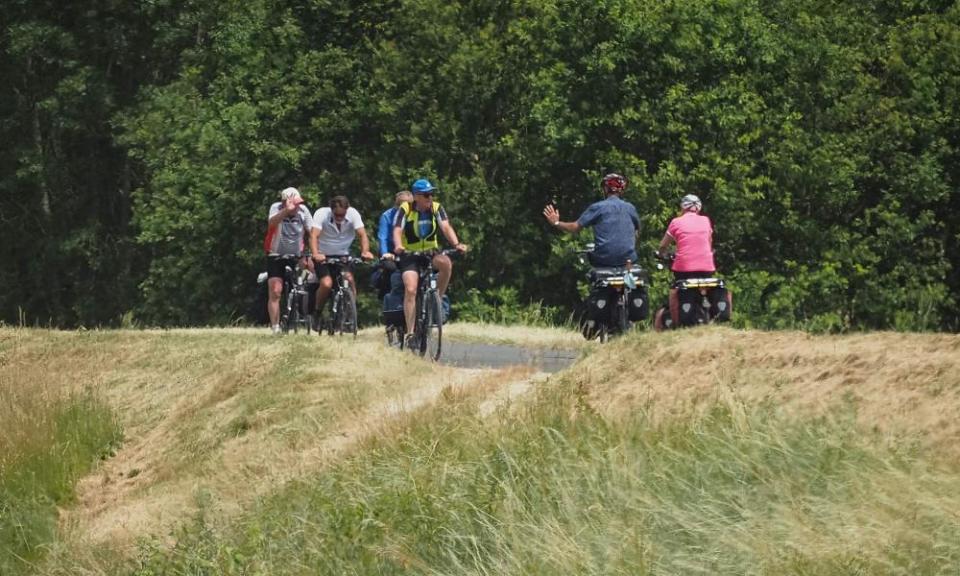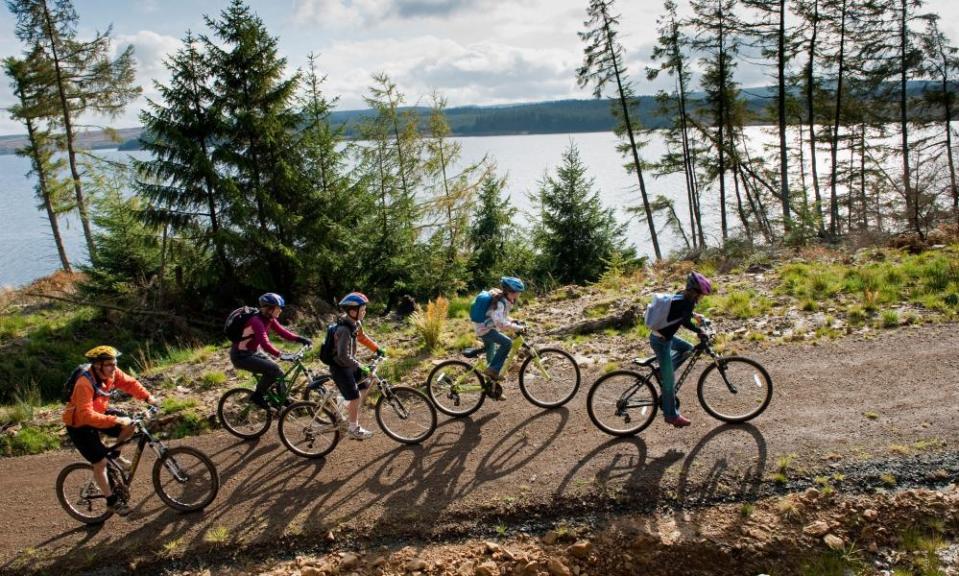How to take a cycling holiday this year despite the pandemic

Pandemic pedalling might have kept you fit and sane during lockdown, but if you’ve seen enough of your local lanes to last a lifetime, this summer could be the perfect time to spread your cycling wings. There’s a big wide world out there, but with travel bans likely to remain in place for many of the far-flung destinations that usually attract bicycling Brits, the safest and most accessible trips will be in the UK and mainland Europe.
Independent trips
DIY cycle tourism is flexible, especially if you carry your accommodation with you. Campsites in popular locations are filling up fast, though.
Leave-no-trace wild camping – where you pitch far from the madding crowd and ship out your poo – is possible almost everywhere, but post-lockdown parties fuelled by booze and equipped with cheap duvets and throwaway tents have trashed some areas in Cornwall, the Peak District and even rural Northumberland, leading to some wilderness camping bans and much wariness from locals of anybody carrying camping equipment. Steer clear of the honeypot locations, pitch out of clear view at dusk, and you should be golden.
Related: 10 of the UK's best hotels and hostels for cyclists and walkers
Owners of UK and European hotels, B&Bs (air or otherwise) and cottage or chalet lets are reporting a brisk trade in bookings so, as with campsites, the earlier you book, the better. With an eye on possible coronavirus flare-ups, many are offering generous cancellation terms. Some are also stipulating three-night minimum stays – fine for circular day touring but not suitable for A-to-B cycle tourists.
Guided trips
Long-time cycle holiday company Cycling for Softies is up and running again.
“We are taking bookings for almost all of our tours,” said Harvey Downard, head of cycling. “Portugal is the only exception. France is racing ahead in terms of demand because of the ease of driving there.”
The firm is reopening its base in the Loire Valley from the beginning of August and, instead of closing it as usual on 1 October, may keep it open until the end of that month.
Saddle Skedaddle’s programme has restarted until September.
“We plan to concentrate on those countries where we operate ourselves with teams out there,” said Andrew Straw, creative director.
This was to have included Spain, but following the latest UK government advice that those returning from Spain now have to quarantine for 14 days, Saddle Skedaddle “won’t be running trips in Spain until [Foreign Office] advice changes,” added Straw.
Getting there
Travelling to distant European destinations remains practical by car (motorway travel can be boring), and entirely possible by air (social distancing be damned: airlines are already packing in passengers like sardines). Still, for many, it’s most pleasurable by train – though despite being green, rail travel tends to be the most expensive option.
Train travel with a bike is, in theory, flexible and on regional routes free, but cycle carriage rules differ among European rail carriers and, on most high-speed trains such as TGV in France, you have to book in advance and pay €10 (£9) per bicycle.
Airlines will accept a boxed bike, usually for a fat fee. You’ll need somewhere to store the (expensive) bike box, or trash a cardboard one and arrange another from a bike shop for the return journey. (Bike shops are usually happy to offload such boxes, but flimsy cardboard is catnip to heavy-handed baggage handlers.)

Rentals
If you’re heading to an area keen on cycle tourism, hiring a bike at your destination can be the travelling-light option. High-end carbon road bikes, top-spec full-suspension mountain bikes and, increasingly, various flavours of e-bikes can all be rented in many mountain and coastal locations, though sometimes for weekly rates that could buy you a bike outright.
Bring pedals and, if you wear one, a helmet. It is also wise to pack a mini-pump, inner tubes, and a hex-key set because not all rental operators equip their bikes with these essentials.
Insurance
Holiday insurance needs to specify cycling and, for peace of mind, it could be worth upgrading your policy to offer “any cancellation reason” and “named perils” coverage: the former is a belt-and-braces add-on, and the latter covers coronavirus complications.
“Leading travel insurance members will look to extend cover for emergency medical treatment for up to a minimum of 60 days for customers stuck overseas and trying to return home,” said a recent statement from the Association of British Insurers.
Insurefor.com and Allclear offer specific Covid-19 medical and cancellation cover.
The European Health Insurance Card (EHIC) remains valid for UK travellers until 31 December. The EHIC gives Britons another few months of peace of mind before the Brexit transition period ends, with the right to access emergency state-provided healthcare during a stay in EU nations and Switzerland.
Maps
Turn-by-turn route guidance on your smartphone is superfast and reliable on cycle.travel, a browser-based essential for bicycling digital nomads. Unlike the newly upgraded cycle routing service on Google Maps (“we use machine learning and complex algorithms,” says Google) cycle.travel’s routing engine always chooses the “best route on quiet lanes and cycleways”.
Produced by a tiny team of English cycle-touring cartographers, cycle.travel works across Europe and beyond. It lists an impressive number of named cycle routes, mostly in the UK and France, with curated travel suggestions, including accommodation.
Britons abroad
If in England, check the latest travel guidance from the Foreign Office, which publishes the list of countries where British citizens may or may not go. There are slightly different travel rules for Scotland, Wales, and Northern Ireland.
From 10 July, UK nationals have been able to take “non-essential trips” –that’ll be holidays, then – to a select number of countries without facing quarantine on return. Austria and the Netherlands still have restrictions on travellers from countries that have had high levels of coronavirus, including the UK. And now Spain is also back on the quarantine-after-travel list.
This is a reminder that the virus is still around and until there’s a vaccine, the threat of it returning will linger. But the levels in many other European countries are now very low. For example, travellers to Switzerland might be shocked but pleased to discover that strict adherence to stringent containment rules has allowed citizens and visitors to live normally – a recent study rated Switzerland the most coronavirus-safe country in the world.
On your return from European countries you have to fill in an online form stating, among other things, your fixed location in the UK.
Trip ideas
Scotland
New for 2020 is a long-distance cycle trail following old drove roads. The 330km (205 mile) Drovers’ Trail was commissioned by Highland Perthshire Cycling, a charity set up to promote cycling in this pristine part of Scotland.
The project was delivered by Markus Stitz of Bikepacking Scotland. “The route is aimed at bikepackers, but designed with gravel bikes in mind,” said Stitz. “There’s no signposting but people can download the GPX [navigation] files for free.”
In addition to the multi-day Drovers’ Trail, Stitz has developed 11 day-rides, starting from Dunkeld, Pitlochry, Blair Atholl and other small towns, plus one remote train station.
Related: The ride that always delivers: cycling the Postman's Path, Isle of Harris
Drove roads were trodden into the dirt by 17th-century cowboys driving cattle through the Cairngorms and Tay Valley to Crieff before the beasts were delivered to markets in northern England and then on to London.
A far older trail is Dere Street, the Roman road from York through rural Northumberland and into Scotland. Gravel bikes are ideal for this route because it’s a mix of tarmac and dirt: much of Dere Street is underneath the modern A68 with the most scenic part heading over the Pennine Hills to the dramatic Roman camps at Chew Green on the Otterburn military firing range. (Check for firing times.)
The distinctive three hills above the Border town of Melrose are your aiming point as you come down from high moorland, zigzagging down steep hillsides that the Romans traversed in the same way. There are no ruins to see at the trail’s end at the former Roman town of Trimontium (“three hills”) but for a self-catering stay in a surprisingly cosy Scottish castle (renovated by the former Liberal leader David Steel, Lord Steel of Aikwood, who lived here for some years) head a few miles west to Aikwood Tower, now open for bookings again. You’ll need to stay for a weekend or more, but that’s no sacrifice as there are plenty of further ride options in the area, including the downhill and enduro mountain bike trail centre at Innerleithen, 24km away.
Wales
Wales-based Jack Thurston, the author of the Lost Lanes series of UK cycling guidebooks, recommends riding the 400-km Lon Las Cymru trail.
“It’s the Welsh end to end,” he enthuses.
Typically, there would be plenty of accommodation en route, but availability is shrinking, including at campsites.
“Welsh campsites have only just opened, and I am hearing that they are running at lower occupancy and requiring booking ahead, often for multiple-day minimums,” warned Thurston.
“Availability isn’t usually a problem for inland campsites in Wales, which are rarely ever full, but everyone wants to go camping this year.”
Switzerland
Many of the roads in the Valais region of Switzerland have been resurfaced this summer because of the UCI road cycling world championships from 20-27 September. Spectators will be expected to respect one-metre social distancing rules and the 20km loop up and down from Martigny – ridden seven times by elite riders after a 180km run-in – will be fenced off and policed.
Train travel from London to Le Châble is £538 return and includes Eurostar, TGV and CCF Switzerland.
France
France Vélo Tourisme is the official website to discover France by bike, using cycleways, canal towpaths, rail trails and almost car-free roads.
Highlights include the 600km La Vélo Francette, a flat, river-valley-following signposted route from Normandy to the Atlantic, half of which is entirely car-free. Much of it links existing cycle routes, including La Vélodyssée on the Atlantic coast and La Loire à Vélo.
Return rail from London St Pancras to La Rochelle costs about £150. Channel crossings between Portsmouth and Ouistreham are by Brittany Ferries – one way with a bicycle costs about £40. From the ferry port there’s a 15km canal-side cycleway to Caen.
Part of La Vélo Francette uses La Véloscénie cycle route, a signposted trail from Paris to Mont St Michel via Chartres through Normandy.
When booking accommodation en route, look for Accueil Vélo, or “Cyclists Welcome”, a national accreditation scheme guaranteeing a high quality of welcome and services for cyclists.

